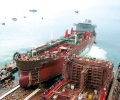

China has introduced the world’s first oil tanker equipped with adjustable sails, marking a notable step in maritime decarbonisation. The 250‐metre vessel features automated sails that harness wind power, cutting diesel use by up to 14.5 tonnes per day-equivalent to around 5,000 tonnes of CO2 emissions annually.
The ship was launched at a major Chinese port on 13 July 2025. Naval engineers report that the sails adjust in real time to wind conditions, seamlessly integrating with traditional propulsion systems. Under favourable conditions, the sails alone can provide up to 10% of the vessel’s forward thrust, reducing reliance on fossil fuels and trimming operational costs.
Industry experts describe this as a breakthrough. Dr Li Wei, a maritime technology specialist at a prominent Chinese university, observed that“this marks the first large‐scale application of intelligent sail technology in an oil tanker” and said that the design“could serve as a blueprint for future green tankers”. While alternative zero‐carbon fuels remain the focus of long‐term strategies, sail augmentation presents a practical interim solution.
The initiative aligns with global regulatory pressures. The International Maritime Organization has committed to halving greenhouse‐gas emissions from shipping by 2050. Flettner‐style rotor sails-used on vessels like the Viking Grace ferry-have shown up to 20% fuel savings on optimal routes. China’s innovation refines that concept by adding adjustable sail arrays tailored for large oil carriers, suggesting broader applicability.
Major energy and shipping firms are reportedly evaluating roll‐outs. A senior executive at a state‐affiliated shipping group noted plans to retrofit a fleet of oil and chemical tankers with adjustable sails by 2027, contingent on performance data. Initial trials aim to quantify actual fuel savings, spreadsheeting data on fuel burn, wind usage hours, and analytics from the ship’s sail‐control system.
Yet questions remain. Retrofit costs, structural modifications, and maintenance demand rigorous cost‐benefit analysis. Port infrastructure adaptation-such as clearance for sails and crew training-must also be addressed. Critics argue that, while useful, sail technology cannot fully eliminate emissions without complementary measures like low‐carbon fuels and electrification.
Nevertheless, China’s venture may shift the conversation. Shipbuilders in Europe, Japan and South Korea are racing to develop hydrogen‐ or ammonia‐powered vessels. China’s move showcases an alternative decarbonisation route by optimising existing diesel‐powered fleets. Multi‐source interviews show growing interest from global charterers, some of whom are signalling willingness to pay premium freight rates for lower‐emission vessels.
Maritime insurers are recalibrating risk models, acknowledging that adjustable sails could affect stability and route safety. The new tanker reportedly features advanced ballast‐control systems to compensate for wind forces and automated cut‐out mechanisms during storms.
Trade analysts say China’s state‐backed strategy gives it leverage in global standards talks. Should pilot data validate the 14.5‐tonne daily fuel savings estimate, Chinese shipyards could license or export the design. Such a trend could trigger wider international adoption, pressuring other nations to follow suit.
Shipowners are watching. A European tanker operator, examining images and footage, expressed interest but noted the need for“transparent data on lifecycle emission reductions and economic viability over 20‐year vessel lifetimes.”
Current trials will last six months to a year, tracking metrics like fuel consumption, sail uptime, and maintenance costs. A detailed performance report is expected by mid‐2026, after which retrofit plans may accelerate.
Notice an issue? Arabian Post strives to deliver the most accurate and reliable information to its readers. If you believe you have identified an error or inconsistency in this article, please don’t hesitate to contact our editorial team at editor[at]thearabianpost[dot]com . We are committed to promptly addressing any concerns and ensuring the highest level of journalistic integrity.
Source: MENAFN- The Arabian Post